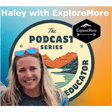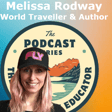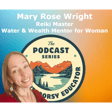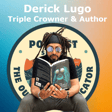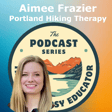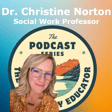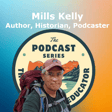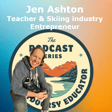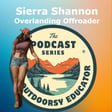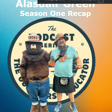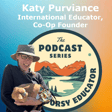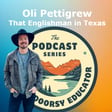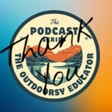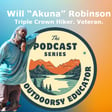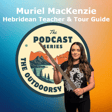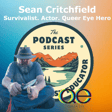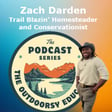Become a Creator today!Start creating today - Share your story with the world!
Start for free
00:00:00
00:00:01

Aline "Abstract" Drufovka
Join us for a wonderful conversation with Abstract, who turned a passion for thru hiklng and exploring the wilderness into a thriving art career. Be sure to follow her @abstract.hikes for more information!
Recommended
Transcript
00:00:00
Speaker
you Welcome to the Outdoorsy Educator podcast, the show where curiosity meets the open road. I'm your host Alistair and I invite you to join me as we explore the world through travel, adventure, nature and the power of learning. Each episode we dive into inspiring stories from adventurers, educators and global citizens.
00:00:24
Speaker
Whether it's in a classroom, on a local trail, or adventuring halfway across the world, there are stories to be told and lessons to share. So pack your curiosity, lace up your boots, and let's discover how the world can teach us all one step, one story, one adventure at a time.
00:00:47
Speaker
Joining us this week is Alina Drufovka, a passionate thru-hiker and wilderness enthusiast who's tackled both the Appalachian Trail and the Pacific Crest Trail. But her story does not stop at the trailhead.
00:01:01
Speaker
Alina has taken her deep love of the outdoors and transformed it into a thriving career as an abstract artist, creating bold, vibrant works that capture the emotion and energy of wild places.
00:01:14
Speaker
Whether she's hiking thousands of miles or painting sweeping wilderness-inspired canvases, Alina brings a unique and inspiring perspective to everything she does. So lace up your boots, grab your sketchbook, and let's dive into this conversation with Alina Abstract Drufovka.
00:01:34
Speaker
And we're here today with Abstract. Abstract, how are you today? I'm pretty How are you? Wonderful, thank you. Why don't we start off, just tell us a little bit about yourself, who you are, where you come from, the usual kind of stuff.
00:01:46
Speaker
Yeah, sounds good. I'm Alina Drafovka, or abstract is my trail name. I'm originally from Philadelphia, but have been nomadic ever since I graduated from college in Colorado. And I'm an artist and through hiker. I've hiked the Appalachian Trail one and a half times and most of the Pacific Crest Trail and a bunch of other hiking along the way.
00:02:10
Speaker
Very nice. um So when did you do the Appalachian Trail? but yes both times Yeah, so I first attempted it in 2015 and got injured halfway. And then I went back in 2017 and through hiked it then. And then I've also worked as a guide along the Appalachian Trail and spent a lot of time on it when I was younger as well.
00:02:30
Speaker
Very interesting. So you because you were raised in the Philadelphia area you had reasonable access to get over. Um, yes and no. I mean, I grew up in center city, Philadelphia. My family's not outdoorsy at all. It was just happenstance that I went to a sleepaway camp in New Jersey and they had an optional program when I was 13 to do a week on the Appalachian Trail and a week canoeing the Delaware. And so I signed up for that. And that's what kind of ignited this spark when I was 13 that I've been obsessed with the trail ever since. I tried to graduate early from high school to do it.
00:03:06
Speaker
um And then 2015, I took a semester off college to do it. So it was really a lifelong dream. That's really interesting. so i I've just done little tiny, tiny bits of it, but I did most of New Jersey last fall.
00:03:21
Speaker
My in-laws live just off the very close to the Delaware and all of that. So the area you'll be familiar with. Yeah, it's a beautiful state. Like I think New Jersey gets a bad rap, but it's really beautiful on the trail.
00:03:33
Speaker
So until Kate and I got married, we'd been married 10 years. um I knew Newark. Like that was it. i didn't I'm sure it's the same for many people. You know, they just see the airport and that part of it. But my in-laws are up in the sort of northwest part of the state. And it's it's absolutely stunning.
00:03:50
Speaker
Yeah, no, definitely. It definitely caught me by surprise. Yeah, yeah. Really, really nice. So you did it in 2050, but you got injured along the trail. Is that right? Yeah, I got injured in Pennsylvania. Yeah.
00:04:02
Speaker
Right. Did you trip over rocks or something? Cause that's what it's notorious for. No, it was more just a stress injury that built up over time. So I just woke up one day and couldn't walk and I went back home and got an MRI and I had bone contusions in my knees. So that's like the step before fracturing. So I think I was just going too big of miles, carrying too much weight.
00:04:24
Speaker
So when I went back, um I did a lot lower mileage and carried less stuff. Good for you. And then you you completed the trail in 2017. Is that correct? Yes. I went back and started over in 2017. Oh, you went all the way back to Georgia. Yeah. and Was that more of a – Was it like a mental thing? Like you wanted to do it start to finish? Yeah. I've always wanted do start to finish. I had considered just getting back on where I left off, but then it was only $50 one-way ticket to Atlanta. So I figured why not just start over? It's meant to be.
00:04:59
Speaker
Yeah, I think there would be, I'm trying to think if if I was in that situation, I think that the pool to do it from beginning to end would be too big. Yeah, exactly. I think it's have to do.
00:05:11
Speaker
And then, so then you went out west, you say did the PCT? Yep. So yeah, in 2019, my partner who I met on the Appalachian Trail and I went and did the PCT.
00:05:22
Speaker
It was a really tough snow year in 2019. So we flipped and flopped. um So we got in around 1900 miles before we were just too late into the season. It was getting really cold and I just wasn't having fun anymore. But we got to do all the highlights. I mean, Washington in July was beautiful. we got to do the Sierras.
00:05:42
Speaker
um So we're just missing the section from Truckee to O'Lali Lake. Right. I know where you are. I'm following quite a few people just now who are on the trail and it's it's definitely, it seems like a trail of extremes. I mean, there's been from the snow to the heat in just a couple of days. Yeah, I think it's become increasingly more difficult to do a linear through hike of the PCT unless you really do have that mountaineering skills to go through the Sierras with the snow and then because of fires and all sorts of different environmental situations.
00:06:17
Speaker
Right. It's very hard, yeah, to go straight through. Yeah, it just, I mean, as hard as the AT can be, ah it just looks like another level of expertise is needed yeah to truly to truly get through the PCT.
00:06:30
Speaker
Now, it was Snoopy, go on your website this morning, and I've got to ask you, how did you end up stuck in Costa Rica? I'm assuming this is just before COVID, you know when COVID took Yeah, I just thought that's that's an interest. There's got to be a story there. Yeah.
00:06:44
Speaker
Yeah, i mean, it's another story of a cheap one way flight, really. at the time, my partner and I were living in Philadelphia, just working kind of random jobs in between adventures. And I saw I forget how much it was. Maybe it was like $100 way flight to Costa Rica. And I was like, oh, it'd be cool to go for two weeks or whatnot for vacation.
00:07:05
Speaker
and it at that time, like COVID was really only being talked about in China, like there weren't any cases in the US yet. It was on my radar, but no one around me was deeply concerned about it.
00:07:18
Speaker
And so we went to Costa Rica, you know, we're just having vacation there, having a good time. um and then all of a sudden our flight got canceled and kept getting canceled. um And then, yeah, we ended up having to sign up for an embassy repatriation flight um because the airlines had canceled all the flights.
00:07:37
Speaker
And so we were waiting to hear from the embassy. And in that time, we were stuck there for like an additional month or two. i forget exactly how long. um And in that time, everything in Costa Rica had begun to shut down.
00:07:49
Speaker
um So you couldn't go to the national parks anymore. You couldn't even go to the beaches and a lot of even just like downtown in a little small town. They would have caution tape around the playgrounds, like everything was shut down.
00:08:03
Speaker
um And so because of that, we were actually staying at this little hot springs outside of the town of Arenal. And the guy who owned the hot springs just gave us a really good deal because he understood the situation and let us stay there for like $15 a night.
00:08:19
Speaker
um And there was nothing to do and no one there. And I just had this little watercolor set. And so I started painting. I've always painted. um And because I have the time I was sharing it online and sharing it on Reddit. And yeah, it just started to get momentum.
00:08:35
Speaker
And I just kind of kept going with it. So I've got lots of questions I want to ask you about your art, you know, and because that's it's a world I know nothing about. um But if I don't ask you this now, I'll forget.
00:08:47
Speaker
what What do you, like if you're stuck in Costa Rica and ahm very it sounds like a wonderful thing, this guy gave you a good deal. and But there must be people who were there in a similar situation who go, I don't have the money to stay indefinitely.
00:09:01
Speaker
Like, or or, you know, a place to stay indefinitely. Does the government kind of step in and help people out? Well, the you're the European government, it seems from the Europeans that were there definitely helped to them out and they were able to get out right away. um Right.
00:09:16
Speaker
Yeah. The only other people we met at that point were other Americans waiting for repatriation flights. um that kind of dragged on The Europeans got out there quick. Right. So there really wasn't much tourism left. And so I think because Costa Rica as a country is so dependent on tourism for their economy, the people that owned Airbnbs or hostels or whatnot, you know there goes all their business.
00:09:39
Speaker
So they really wanted if they can get someone who they know stuck there to stay at their place, even for a discounted rate, you know that's still business coming in. Right, yeah, a few dollars is better than no dollars at all, I suppose. Yeah, so everyone was trying to offer us discounts as we were still lightly traveling around during that time.
00:09:57
Speaker
Right, and I've heard nothing but good things about Costa Rica. Was it everything you hoped it would be? Yeah, no, it's beautiful. Even during those times? Yeah, it's a beautiful country. It feels very safe. The food is good, easy to travel around. So yeah, it's definitely on my radar.
00:10:15
Speaker
If I could theoretically economically live in two places, I'd love to spend part of the year somewhere like Costa Rica. Right. No, it sounds we've got yeah various friends that have been and nobody's had a bad one to say about it at all.
00:10:28
Speaker
So yeah, the nature's beautiful. I mean, it's not the cheapest country. i mean, because of factors like it being so safe and then protecting the environment, like just to go on a hike there generally is going to cost like $10 at least. It's not like here where you just go to trailhead and it's free.
00:10:47
Speaker
Right. But you get the feeling the money's going to a good place and for good causes. so Exactly. Yeah. So you started touching on your art. And I am one of those people who I assume you encounter all the time who can perhaps appreciate it and be like, that would...
00:11:02
Speaker
but I've got got an artistic bone in my body, you know, and I wonder, how like how do you get into art in the sense of painting in a very rudimentary, basic way and building it up to be a career?
00:11:15
Speaker
Like how does that happen? I mean, it's not something I ever expected. definitely grew up with the trope of starving artists. No one, even though I was always interested in painting and always painted, no one in my family was ever like, oh, you should be an artist. It was like, no, you should be a lawyer or something practical.
00:11:31
Speaker
um But my dad's from Columbia and a lot of his relatives are artists there. and don't know if you're familiar with like Botero. no That's okay. He's one of the bigger artists in Columbia. So he's distantly related. And so, yeah, it's definitely been part of my family.
00:11:51
Speaker
um My dad's side's very creative. But again, it was just a hobby for me. After college, um I had made a lot of just like abstract paintings. And my brother really liked one of them and he went to get it framed at a local frame shop that's also an art gallery. And when he went to get it framed, the woman there was like, oh, this is really cool if she wants to be part of this like little show we're doing. And this was just like a super small like neighborhood art gallery. But the idea that like I could even have my art for sale, like I never even crossed my mind before that.
00:12:25
Speaker
um So that was just kind of the start. And i just started painting a lot when I was living in Philadelphia after college and had my art in different coffee shops and restaurants that I reached out to. And I would sell some small pieces through social media.
00:12:39
Speaker
But again, I never really thought it would take off or go anywhere. I'd sell a couple paintings a year. and just throughout the past, you know, 10 years, like before I started my business,
00:12:51
Speaker
Yeah, just when I was traveling, maybe I would do a craft fair here and there and sell a couple things. But yeah, it was really during COVID when everything slowed down and I lost my jobs and I kind of just went all in on both creating and sharing on social media. um That it built momentum and commissions, but it was never really...
00:13:11
Speaker
the life plan. I had no idea what I was going to do with my life. Right. And when you went, as you said, all in, did it feel like the right thing? Was it scary? Was it kind of both or you know what must be some feelings behind it?
00:13:25
Speaker
Yeah. I mean, it just kind of built organically. And because like in terms terms of like the start the business, I was just making paintings. and uploading them to websites that handled all the fulfillment of orders.
00:13:37
Speaker
So all i was doing was creating the art. I wasn't buying inventory or paying for ads or any of more of that technical business acumen. It was a very simple model. And then people started commissioning things. And then a lot of those commissions ended up becoming stickers.
00:13:53
Speaker
um But yeah, no, I think even now, five years in, i still feel like, what am I doing? Is this really going to work out? um There's definitely no security in it.
00:14:05
Speaker
But at the end of the day, i am just very passionate about it. And, you know, it's therapy I get paid for, is what I say. that's That's a really nice way of looking at it. I like that a lot. And then you to me, again, somebody who's not you know well versed in the art world, to me, you have a very distinctive style. Has always kind of been like that? Has that been sort of your signature or has it developed as you've developed and grown?
00:14:32
Speaker
Yeah, no, i mean, when I was younger, I've always loved painting nudes since I was in high school. But no, before this style of business, which is abstract types, it was like large abstract and abstract nudes. So completely different style.
00:14:49
Speaker
right Way more large scale. I can show you an example. Yeah. Oh, that's fantastic. Right. Thank you. um But yeah, I mean, obviously hiking and through hiking was such a big part of my life. So it's not surprising that in 2020 when everything came to a halt that I would start painting things inspired by that experience.
00:15:12
Speaker
But as much as I love painting hikers and that style, I would say if I could paint anything, I would probably say I'm still more naturally drawn to like large abstracts and nudes.
00:15:24
Speaker
i'm right I just found a market more commercially for the hiking stuff, which I still love. But of course, that's just, yeah, all creatives balance like what's commercially popular versus like what their soul wants to create.
00:15:39
Speaker
Right. And I suppose that you've got to try and find that balance and hopefully do both. Yeah. That would be the thing. And again, ah when we put this podcast out, well I'll pull some pictures of your art.
00:15:51
Speaker
I look at it and i go, well, where do you start? Where do you start with that? So I'd love it if you could talk me through the process a little bit without giving away all the trade secrets. You know, how does it go from ah blank page to a finished work of art?
00:16:05
Speaker
Yeah. Well, before it's a blank page, it's just an idea in my head. Um, and generally i really flush out the idea in the bath. Like I'm a huge bath person.
00:16:15
Speaker
i even wrote my college admission essay about writing my college admission essay from the bath. right I used to always do all my homework in the bath. So I'll spend like a few hours in the bath, looking at reference photos, sketching, coming up with the idea.
00:16:30
Speaker
um and then I create like a trace of the rough idea stencil. um And if it's a commission, obviously I'm getting that approved by the customer to make sure they like it.
00:16:42
Speaker
And then from there, just kind of send it like because I'm not traditionally trained. I didn't go to art school. Like I've taken some art classes when I was younger. i don't have a very technical approach. I kind of just dive in.
00:16:56
Speaker
And whenever I feel like painting, like I joke, you know I look at my to do list some days and it says like paint snail. Right. yes There's an absurdism to it all, I suppose.
00:17:07
Speaker
um But yeah, i just kind of dive dive in and generally I paint for I'll go for like eight, 10 hours, but I've had to become more careful because my wrist does get quite sore.
00:17:19
Speaker
Because I've painted a lot. Right. But yeah, i create an initial sketch for a customer if it's a commission, but it always ends up a little bit different.
00:17:30
Speaker
You can never fully plan it out, I suppose. Right. And I think you've kind of touched on this, so I suspect the answer might be the potential insecurity, but the biggest challenge of being an artist, is it worrying about the future or is it, you know, how do you promote your work now? Or what would you say is the thing that could could keep you up at night if something was going to?
00:17:51
Speaker
oh I mean, I guess just like not it not being sustainable economically or becoming irrelevant in that my business has been becoming very dependent on social media. That's how I built it. That's where most people find me.
00:18:04
Speaker
And so to be economically dependent on something as fickle as an algorithm right not always a great feeling, but I don't know, I guess wherever life takes me. And even if I were to pivot at some point professionally, i know I'd always paint.
00:18:22
Speaker
So And I think at this point, I've reached a certain level of confidence that I could always create something that someone would want. Maybe not for tens of thousands of dollars, but yeah, I think I have a million ideas and I plan to paint them all. And I don't think much keeps me up at night at this point related to business.
00:18:46
Speaker
Good. And then now you're at this stage of your career and you're maybe, and you're aren being an artist, thinking long term. How does, what does success look like? Is there a definition? is there a moment where you think I've made it or is that not something that, you know, or maybe you already have, you know? Yeah.
00:19:04
Speaker
That's a tough question. i mean, I've had a weekly existential crisis since I was 13. Yeah.
00:19:11
Speaker
I think like if I look at the things that I aspire to when I first started this, I feel like I've actually achieved a lot of them. Like I've worked with all the brands I've wanted to, whether that's like a REI or Outside Magazine. And like, you know, I'm still in the process of expanding my wholesale and, you know,
00:19:29
Speaker
The dream at one point was to have my stickers and all the ah REIs and I am still pursuing that. And perhaps that used to be my metric of success. And while that's something I'm still striving for, i would say at this point in time, i think success maybe looks a bit more like just creating the things that i yearn to create.
00:19:51
Speaker
um And I think the existential, this week's existential crisis, or i suppose it's been going on for a while. It's just, wanting to scale the business for a certain level of economic security, but worrying that with scaling the business and having that traditional success economically, am I going to have time to create what I want to create, or am I going to get absorbed in the admin work of running a business?
00:20:15
Speaker
um And as much as I want to believe there's a balance in there, i think when it comes to being an entrepreneur, it can be very hard to have a balanced life. Yeah, I would imagine if you're in the arts or an artist and you're you going out on your own starting a business, the the paperwork, the tediousness, that side must be ah must be a challenge because I assume it it goes against your nature of what you want to be spending your days doing.
00:20:41
Speaker
Oh, definitely. and I think that was one of the big challenges is that until a year and a half ago, i didn't have a permanent address. Like I was using my mom's, you know, my home address when I grew up because I've been so nomadic since college. I've never lived anywhere for more than a year until we moved here.
00:20:58
Speaker
We were living out of a van for a while when we were working for Outside Magazine. We've lived out of my partner's Tacoma. So we've moved around so much, which is partially how I was able to grow the sticker business because stickers take up so little space in terms of inventory.
00:21:13
Speaker
um But yeah, all that bureaucracy, I didn't want to take those next steps of really expanding the wholesale until my business was actually located where I actually live and I have a place to store things.
00:21:24
Speaker
So when I moved here South Carolina, because they don't allow something called like domestication of LLCs, I had to start a whole new LLC, dissolve my LLC based in Pennsylvania, um start new bank accounts and change everything to this new state.
00:21:40
Speaker
um But now I feel like I finally have all my ducks in a row. I've spent $1,000 on barcodes, like all this just boring stuff. I don't to deal with it. I just want to paint, but my business isn't. I was at a point where I can hire people to do it for me. Of course.
00:21:55
Speaker
um So last question about your art in particular. yeah just I find it a fascinating one. Like said, I can go to an art gallery. We're fortunate to have a few nearby. And I can appreciate it.
00:22:06
Speaker
I can look at it and go, i I think that's amazing. And I'm in all But if you met somebody like me who draws about this at the same level that I've drawn at since I was eight, but if that was a goal of mine was I want to be able to be competent. I'd like to be just a decent artist so I could sit and draw something and feel good about myself. Where does somebody start?
00:22:29
Speaker
Or what would you recommend? Any words of wisdom? I guess it depends what you want to draw. I mean, I think that's the beauty of abstract art anyone can create abstract art without technical skill.
00:22:40
Speaker
Like obviously there are certain color palettes that are going to come together to be more beautiful, but it's all subjective and there are no rules. To me, there are no rules and it's all subjective. So I think if you let go of that, then perhaps you already could create something of a level of competence that you'd enjoy.
00:23:00
Speaker
I love that answer. It's a very artist answer yeah as well, right? that's yeah I would love to do more like live painting events. Like obviously I do have some technical knowledge, um not as much as someone who like went to art school per se, but I recently and led a live painting event um at the Outside Festival in Denver and that was really fun and I feel like that's like a key element missing from my life and profession is that I exist on an island. Like, yes, I do events and have certain opportunities that are social. But in general, it's a very isolated career.
00:23:34
Speaker
And I'm a pretty social person. and so I have been thinking lately about ways that I can create a more social aspect of my business, whether that's like taking people on hikes and painting or other things.
00:23:48
Speaker
Yeah, to me that would be an amazing half day or day trip if you went to a two or three mile hike to ah a waterfall. You showed people how to just, you know here's how you can create this and then hike back with your painting.
00:24:01
Speaker
Like what a great day that would be. Yeah, so think maybe I'll do that one day. All right, hold the spot open for me. I'm in, I'm in. Now, you brought up Outside Magazine, and I think, I was thinking about this this morning. I believe I started following you a couple of years ago through Outside Magazine.
00:24:18
Speaker
Oh, wow. Because you took off for a year, basically, right? You were in their van going from event to event. I'd love to hear how that happened. what That's a great experience, and I would imagine one that a lot of people ah would love to do themselves.
00:24:33
Speaker
Yeah. what was that What was that like, and how did you get involved in that with Outside Magazine? Yeah, so it was a seven month um contract, but it's kind of long story, but I'll try to make it somewhat succinct.
00:24:44
Speaker
But basically, I've always wanted to work with Outside Magazine and at the beginning of my career, I was just way more bold than I even am now, I'd say in certain ways, like I would just slide in people's DMs or send messages to people that I wanted to work with.
00:24:59
Speaker
And so I had reached out to a woman who was a writer for Outside Magazine um about like working on illustrations for them. And so I had done several illustrations to company articles for them prior to that opportunity.
00:25:13
Speaker
And then they were launching an n and NFT marketplace, if you know what and NFTs are. Is that non-fungible token? Yes, yes, exactly. i know logically what it is, but my brain still struggles to wrap around exactly what it means.
00:25:28
Speaker
That's fair. I probably don't fully grasp it either. But they were launching their own NFT marketplace. Someone I had known from actually the REI entrepreneurship um network that I'm part of had shared about it. And so I applied for that and ended up talking to this woman, Kirsten Stone,
00:25:46
Speaker
about it and I was going to like launch an NFT with them and they invited me to the NFT launch party in New York City where Jack Johnson was going to be releasing his new album and he was going to be their first like NFT launch and I'm a big Jack Johnson fan I don't know if you know his music I know a little bit yeah I probably know a couple of his big hits yeah Yeah. And so my partner and I went to that event and we just really like connected with a lot of the outside employees. And, you know, when I'm networking, I give away a lot of stickers. So I had made all these little envelopes with sticker packs and, you know, handed them out to everyone.
00:26:25
Speaker
And I was also hired to promote on social media the launch of their NFT marketplace. And that project didn't really end up going anywhere. But the connections that I made through that um have provided a lot of opportunities throughout the years. So with the Get Outside tour, it was about, I guess, two years ago now.
00:26:45
Speaker
um We were living in Massachusetts. My partner had gone back to school and he had just gotten his first like more corporate job. offer. So after Costa Rica and all that, we had started to like try to build our careers. He went back to school. I was building the art business and he had just finished his degree, got the corporate job offer in Greenville, South Carolina, where we live now.
00:27:07
Speaker
And he had a relocation offer, everything. And I was just like relieved that he finally had like a real job. Right. Cause I met him on the trail. He had a very nonlinear life path.
00:27:18
Speaker
um And we like eventually want to have a family and all that. And so the same day that he got the corporate job offer, which was also our six year anniversary, I got this email from Outside Magazine, my connection there, Kirsten, saying that there was this opportunity to travel in the van and whatnot. There weren't too many details. i didn't know what it paid or if it even did pay.
00:27:43
Speaker
And so I said to my partner, Lyle, I was just like, oh, obviously we can't do this. Like he had just gotten this good job offer. And he was like, no, let's let's take the meeting. Like you never know. Right. And so I'm giving you the really long winded story. No, I love this. Yeah. um And so that day we took the meeting because he had to respond to the corporate job offer within 48 hours is how it works.
00:28:07
Speaker
um And again, it was our anniversary and whatnot. And we were living on a lake at the time in Massachusetts that was frozen, but there was a lot of ice fishing on that lake. So there was these little holes. And as we were doing ah interview, we and talking to who would become our boss, Randy, there was all these otters that appeared out of the ice fishing holes playing with each other, which we'd never seen otters there before.
00:28:31
Speaker
And we're taking this meeting and it sounds like a really cool opportunity. Um, and my partner Lyle really pushed that we should do it. It could be a really good opportunity for my business and also to promote that along the way.
00:28:43
Speaker
and so, yeah, it was just kind of two forks in the road and he felt really strongly like this is a once in a lifetime opportunity. And then the otters became the symbolic thing. love And so, yeah, we took the job and the first ever event was actually in Monterey, California, um, called the sea otter classic.
00:29:04
Speaker
ah because they have a lot of sea otters there. And then we went to the aquarium and saw like sea otters just became this thread. Our dog ended up playing with some river otters at a different point on the tour. I don't know why the otters, part of it.
00:29:18
Speaker
But yeah, it was a really awesome opportunity and we had traveled by road a bunch, but never while being salaried. So it was definitely hard to transition to real life after that.
00:29:31
Speaker
um But what we're working on it. And then evidently, without ask without prying, it worked out for Lyle and his corporate job because you ended up in South Carolina.
00:29:43
Speaker
Yeah, yeah. In conclusion, as we were coming near the tour, end of the tour, he started applying to other corporate jobs. And the job he had initially got, um that didn't pan out.
00:29:55
Speaker
um Because again, at this point, it had been like eight months later. and I'm sure they filled the position. But he actually got a different job, which I think is a better fit. Like the pay wasn't quite as good, but it's fully remote. And it's more connected to the sustainability angle of his career, which I think is more important to him.
00:30:13
Speaker
And that makes all the difference. I mean, you know better than nado anyone as an artist, you know, the money can fluctuate and come and go, but doing what you love and you care about is absolutely vital.
00:30:24
Speaker
And speaking of things that you love and you care about, I was not surprised to see on your website how important promoting diversity is. Mm-hmm. And I find it very interesting that ah it's obviously important, thankfully, to an awful lot of people.
00:30:36
Speaker
and It's something in my career that has been absolutely at the top of the list in most things I've done. but how as an artist can you translate that desire to promote diversity in the outdoors into something practical?
00:30:50
Speaker
Like what do you do with those fields? I'd love to hear your perspective on what you can do. Yeah, I mean, I think just in the art I create, like on a very surface level, like most of my designs, the majority are of women. So when we think of like backpacking and the outdoors, generally most like generic hiking stickers are going to be of dudes.
00:31:08
Speaker
So like most of the stories I focus on have been women. But beyond that, I also try to have more diverse people represented in the designs that I create and My hope is when everyone looks at the 60 plus stickers that I make, that someone sees one that they feel represented by. And, you know, there's a million more designs I want to create to continue to have a wider spectrum of designs that people can connect with. But I've also collaborated with a lot of different organizations and nonprofits that support that mission. So like most recently i created um ah design for Aldo West's diversity grant, and I'm also on the board of that organization. yeah,
00:31:49
Speaker
helped create that scholarship. And before that, I was working to create a different organization, Unfiltered Outdoors, with the same mission of giving grants to diverse people to hike the trails.
00:32:00
Speaker
And then, yeah, I've just worked with all sorts of nonprofits, American Hiking Society, the Women's Summit. So, yeah, just even though nonprofits generally don't have the same budget as bigger corporate clients, it's worth it to me to do designs that are based on the missions I believe in even if they can't pay what I would ideally like to be Of course, yes.
00:32:26
Speaker
Yeah, but but ultimately doing the right thing and doing the thing that feels right in your heart, I'm sure. Yeah, and I think it's just, yeah, like I notice just at festivals and stuff, like people who aren't traditionally represented in, you know, backpacking designs or whatnot, when they see a design that looks like them, like,
00:32:44
Speaker
There's an excitement over it. They want to hear the story of that design. And so, yeah, I definitely need to create even more to fully accomplish that goal. But I definitely think I have a wider array of diverse people in my designs than most other outdoorsy sticker lines.
00:33:02
Speaker
Yeah, it's very, mean, it's obviously different field, but very similar. I'm in public education. And sometimes people will say, why do you need div diverse people in a book? You know, if a doctor is a doctor is a doctor. what colour It doesn't matter what color the doctor is or what if it's male or female doctor, it doesn't matter.
00:33:20
Speaker
And that's the pushback we'll sometimes get. But it feels a bit like you, when you strip back all the layers and like when I see a child, um who opens up this book and sees ah ah doctor, an astronaut or whatever, that looks like them and they say, that looks like me.
00:33:38
Speaker
Like that moment. that it's a It's a tiny moment in some ways, but also a life-changing moment in other ways. yeah And whilst you're dealing with grown-ups, I imagine there's still that same reaction from some people going, that sticker looks like me.
00:33:53
Speaker
yeah yeah Yeah. I like to think of it also as planting seeds. you know I'm sure even more so with kids, but I'm sure you're planting lots of seeds. Yeah. That's the goal is and normalizing things.
00:34:03
Speaker
You know, what would I look forward to the day where it's not, oh, look, it's ah a doctor that's this color or this gender. It's just normalized because all of these children can do anything they want.
00:34:14
Speaker
theyre They're brilliant and amazing. And it's like, that's why it's important. Yeah. I couldn't agree more. And I feel like even though there's still so much work to be done, especially in the long distance backpacking space, like it has come a long way. Like,
00:34:29
Speaker
you know, I started hiking on the Appalachian trail when I was 13 years old. And I did trips when I was 16 and 18. And at that time, like when I would go out there, it would be like 95% white dudes.
00:34:41
Speaker
And now if you go on the trail, while diversity, i would say is still a big issue. Like it is almost, you know, 40, 50% women. So it's a really vast change that I've seen just in my lifetime. And I'm obviously still relatively young. so Right.
00:34:57
Speaker
So who knows where it will go in 5, 10, 20 years. um Yeah, I mean, I think about it, you know, my daughters are um just just grown up now.
00:35:07
Speaker
But ah you know I would feel safe. I would feel safe with them if they said, you know want to go hike the trail. I think there's enough of a community out there, and I don't know if that would have always been the case.
00:35:18
Speaker
um I think I might have led with fear at one point. But now it's like, no, I've seen enough women, I know enough women who who are blazing the trail, yeah literally and figuratively, going out there that I would feel very comfortable. and that's a really good feeling.
00:35:34
Speaker
Yeah, I mean, unfortunately, I think it is still less safe to be a woman on the trail. at end of the day, like like as a woman, I don't think I would have ever hiked these trails if it wasn't for like personal location weekends. The fact that whether or not I have phone service, I can press an emergency button at any time. Like while I think some of the technological advancements,
00:35:56
Speaker
have hurt the trail culture because people are now still hyper-connected to technology in the outdoors. It also has created this extra layer of safety precautions that gives the confidence, I think, to women and certain other people to feel safer the trail.
00:36:14
Speaker
Yeah, when I was hiking, i I spent about a week on the AT in October last year, and did almost all of the the New Jersey section. And it was the first time that I'd ever, you know, been out on the trail with no cell phone service, of course.
00:36:27
Speaker
But AT&T had launched like this new thing where you could like hook onto a satellite, a bit like a Starlink thing. Yeah. And I quite like that because it did mean if if I hurt my leg or something, something happened, I could get a text message out.
00:36:42
Speaker
But you weren't really connected to anything else. um So to me, it was a really nice blend of art. That gave me a little degree of safety, but not too many comforts from home. I liked being disconnected for a few days. No, it's a perfect mix. I mean, i think the irony of my of starting a business based on my backpacking experience is is that now it's harder for me to disconnect from things and just go backpacking because I'm a one woman business. I have orders to fulfill email But I do really crave and I plan to soon get back out there.
00:37:17
Speaker
Good. Not for six months. No, your business wouldn't survive. Got to keep going. That's it. Well, speaking of your business, I remember I sent you a message. I think it was maybe a year ago. I don't know that my daughter had bought me a cheap package of stickers on Amazon. And lo and behold, there was one or two of your designs in there. And I thought that's, that's weird.
00:37:38
Speaker
you know, and I sent you a message. So could you talk just a little bit about that negative, not negative side of the art world, but there's art theft and how do you ah as an independent small business owner, how can we, A, protect your business if we want to buy your designs and also try to not encourage purchase from, cetera, businesses that might be taking other people's designs?
00:38:03
Speaker
Yeah, no, I mean, I think, unfortunately, so much of what Amazon, Timu, Alibaba sells, um especially when it comes to art, it's just knockoffs and stolen. And it is a a huge negative part of running a business online. But I think if you have any level of success, even, you know, small scale, unfortunately, that's what happens. Like all the artists I follow on Instagram, for the most part, I see this happen to them, which like,
00:38:30
Speaker
while that sucks, it makes me feel a little less alone. It's not like, oh, I was just randomly unlucky. It's just like, no, this is kind of the price to play. And like, that's the trade off of living in this time is there is this like democratization of who can be an artist because of social media. We're not dealing with the gatekeepers of the traditional Galvary world and who your connections are. So anyone can access the public.
00:38:57
Speaker
But with that is also the easy access of people being able to steal your art. And so while it still grinds my gears and makes me really, really, really sad. Right. Where I Google hiking stickers or yoga stickers, it's just unfortunately not worth my time trying to get it taken down because it's just a game of whack-a-mole. As soon as I get them all taken down, they just pop back off.
00:39:20
Speaker
And at this point, I've just kind of made peace with it. Like really all I can do is keep working on my business and trying to scale it um and have that brand recognition where people want the real thing because the knockoffs are going to fade within a couple weeks and are super poor quality. They're super small.
00:39:38
Speaker
um So I would say I have like 95% made peace with it because it's just not going away and I have to live my life. Right. i think just like what people can do. i mean, like obviously a shop small, like I think that's like,
00:39:53
Speaker
We live in a very consumeristic society, people buy stuff. And so if you can buy your gifts for people and spend a few extra dollars from artists or even just for social media, you know, just like,
00:40:07
Speaker
you know you can vote with your dollar you can vote with what attention you give on social media so whether or not you even like it that much if you just engage with artist content on social media like you're helping their business um so yeah obviously just shop small is the simple answer but it still really sucks and pisses me off a lot Yeah, I complain i just imagine, yeah, I mean, you're dealing with ah one end of the spectrum stickers that these people are selling for dirt cheap. And it's international law. I mean, what do you do? There's nothing can do. I mean, I've talked with the US Patent Office. Every single state in the US has the class action lawsuit against Amazon.
00:40:49
Speaker
There's nothing you can do. You know, whatever copyright or trademarks you have, they're not protected internationally. Right. air um So you are just helpless. Right.
00:41:00
Speaker
That's such a shame. You're right. Shopping small, to me, is one of the the things I love about social media and Instagram in particular is the access to small artists, you know small business artists. um It's a great way to get Christmas presents and all of that. And something really likes it meaningful.
00:41:16
Speaker
And you know where it came from. And it doesn't just mean something to the person that I'm perhaps giving the gift to, but also it really means something to who I've purchased it from. Yeah, no, I mean, it goes a long way. And I think the part that cuts the deepest with, you know, Amazon and all these big sites selling my designs is that the designs that get ripped off the most are self portraits of myself and like my style. And so it's not only, okay, this is this thing I painted of someone. It's like, no, this is literally me. This is literally my body that is being sold for sense.
00:41:53
Speaker
on the internet by who knows who. um But you know, you can also flip the script and more of my art's getting out there in the world. So I guess that's something I would be making that money than some random person.
00:42:06
Speaker
But I suppose so. Yeah. All how you look at it. Yeah. um Was we kind of start drawing to and then I've got three questions I wanted to ask you. um Feel free to take your time if you want to pause for a second.
00:42:19
Speaker
Um, We'll take Lyle out the picture for this question, but if you could hike 10 miles with anybody in the world, somebody who was dead or alive, somebody you've met, you've not met, um no so like I said, no significant others, because that's an easy answer, who would it be? Who would you go for a day hike with?
00:42:36
Speaker
I guess the first person that came to mind is Frida Kahlo. I mean, she's pretty cool and iconic, both as a feminist and an artist. And i think I resonate with parts of her story.
00:42:48
Speaker
yeah, that's probably who I'd like. that. And she's one of those people. I know she's a feminist and kind of a pioneer, but not much about her. So that's going to draw when we're finished here. Have Google. Yeah, don't know if you've ever watched her documentary, but the more learned about her life,
00:43:04
Speaker
Yeah, she was just really ahead of her time in a lot of ways. And the ways that she used her suffering and pain as a creative outlet is very inspiring. And I would say...
00:43:17
Speaker
like she suffered a really bad car accident. A lot of her early work she made while she was literally in a full body cast in bed. And while I've never suffered anything like that physically, i would say, you know, at times I have struggled with my mental health and art has been a huge part of my healing process. And she's also done a lot of art around, um,
00:43:36
Speaker
the miscarriage she had and, you know, just being a woman and existing is a wild thing. And yeah, I just admire the work that she has created based on that experience.
00:43:48
Speaker
I love it. Well, I'm looking forward to, like I said, when we got off this call, ah divve deep diving for a little while, finding out more about her. ah My second question for if you could go back in time and either live in a time period or witness a particular historical event, what do you think it would be and why?
00:44:05
Speaker
o I think I've always been drawn to what it would be like to go all the way back to being a hunter gatherer. um Just I think part of what's appealed to me with through hiking and backpacking is just feeling more connected to myself as a mammal and being in that primal state.
00:44:24
Speaker
So I'd be very curious what it'd be like to exist fully in that kind of world. I was speaking to a friend, a good friend of mine, just just yeah know Sunday, think it was, who is homesteading.
00:44:37
Speaker
And that's his driving force is for 99% of human existence. We've been hunter-gatherers. We've had that more of the mammal instinct. And he feels very connected to that and really wants to spend a lot. His his life, that's one of his life goals, is to truly not lose that um in a convenient society.
00:44:59
Speaker
I couldn't, yeah, i couldn't agree more with that. and you know, that's probably last week's existential crisis. Right. Just how do you balance, you know, wanting to be connected to that more primal sense of self while still having certain levels of security that come with living in society and having health insurance and in those worst case scenarios, knowing your health is protected. Because I think if we lived in a society with universal health care and some kind of social safety net,
00:45:29
Speaker
it would be perhaps easier to take the plunge of living a more non-traditional way. 100%. I couldn't agree more. And he and I briefly talked about the fact that I've watched um just enough Homestead Rescue to get crazy ideas about how good that kind of life would be.
00:45:48
Speaker
um And we talked a bit about the pros and cons. But I'm with you. If we had more of a social safety net, I think more people would do it. Yeah, it's just unfortunately, as I get deeper into being, a you know, air quotes adult, it's just life is so expensive. You know, it's like our dog was profusely vomiting a couple weeks ago and she's a small dog. is like you want to make sure your pet's okay if you're outside of vet hours.
00:46:12
Speaker
You know, we went to the emergency vet. That's an eight hundred dollar bill right there. and so if you go all in, you know, living off the land, you're not able to acquire any kind of wealth or safety net in those situations.
00:46:25
Speaker
I don't think I would handle well not being able to provide, you know, some kind of health support to a child or a pet. A hundred percent. Yeah, it's ah it's a tricky one. i I would imagine more people wrestle with this than we know.
00:46:41
Speaker
but You know, people yearning for one life, but society doesn't necessarily allow for it. Yeah, and I have dabbled a little bit with alternatives when I was young. So I studied sociology and I've always been really interested in communes, cults, intentional communities. And so when I was younger, as air quotes again, research, I would go and live for you know a few months at a time on different communes and eco villages and I really wanted to understand if there was an alternative, um especially, you know, while you're still living in community and perhaps community can be part of that safety net, but just everything has so many trade-offs.
00:47:21
Speaker
that's and is that I was going to ask you, what if you could say, it all down to one overarching takeaway from visiting these communes, yeah is it it's a trade-off? Yeah, I mean, I would say everything in life, I say, is CBA's cost-benefit analysis, and there's enough almost nothing that doesn't have a flip side to it.
00:47:41
Speaker
Right. And, you know, to make it all really full circle, you know, I think that's also one of the ideas around my art is duality is like almost all my designs have a sun and moon, a light and darkness. And I would say that's probably like one of the main motifs of my art.
00:47:56
Speaker
See, and I love that. And ive I own some of your stickers. I'm wearing your T-shirt right now. I have your sticker on my car. And I've never noticed that. and know And now that you've said it, every time every time I see a piece of your art or a sticker, I'm going to look for that duality now. And that's and that's that's the stuff I love. you know It's almost like hit hidden in plain sight.
00:48:17
Speaker
That's really cool. um The last one of these three questions I had for you. Can you think of a book, movie, piece of music, or piece of art that has had a huge impact on your life and in what way?
00:48:29
Speaker
Oh, yeah, definitely. um i would say two, but I guess the one most relevant is Into the Wild, um which, you know, is classic. That's a classic one. And while I would say Christopher McCandless has become somewhat of a controversial figure in modern times as, um, a young person. When I first read that book and saw the movie, obviously very much idealizes that kind of free nomadic lifestyle, but. right
00:49:01
Speaker
And also just the rejection of money and society and the values that mainstream society holds, um, is definitely, yeah, definitely had a big influence on me.
00:49:12
Speaker
and I became obsessed. Alongside the Appalachian Trail, I was also obsessed with Alaska. So that really inspired me to go to want to go to Alaska. So i actually did a backpacking trip in Alaska when I was 16.
00:49:25
Speaker
um That was 30 days out in the Wilderness Snow Trails um with Knowles, which is the National Altar Leadership School, if you know them. I know of them.
00:49:35
Speaker
Yeah. I feel like we could talk for an hour about going on a backpacking trip in Alaska at 16.
00:49:42
Speaker
Yeah, so I mean, that experience was definitely, you know, it it does all put tie into everything. But that experience is what really gave me the confidence to become an outdoor guide to hike the trail, attempt to hike it solo. was i But yeah, that program, because it is very based on an educational component of like wilderness skills.
00:50:07
Speaker
I just after that, after like surviving for 30 days out there in grizzly country, no trails, like it definitely gave me a level of confidence and probably was the most I ever felt connected to that more primal sense of self and the longest I've ever gone without showering.
00:50:25
Speaker
Right. And maybe the longest you ever will, but who knows? Probably. Yeah, probably. I when I look back at the things I did between like 16 to 23, I was definitely a lot more hardcore. And I guess, you know, your brain's not fully developed, so you don't have the same level of risk analysis.
00:50:43
Speaker
Right, exactly. And you kind of hinted that there might be two things. you had Into the Wild. We've got time. Is there another piece of music, art, book, movie that jumped out? Yeah. i would say Are you familiar with 100 Years of Solitude, that book? I am not.
00:50:59
Speaker
um It's by Gabriel Garcia Marquez. He's probably the most famous like Latin American author, one of them. It follows a family through 100 years, so multiple generations living in like pre-colonial Columbia. And so my family's from Columbia. And I don't know, I just always really connected with that book. It's, it's a melancholic story. And I think while I'm a very like bubbly, effusive personality, in a lot of ways, I also have a very dark melancholic side.
00:51:33
Speaker
um And I would say I just have always connected with that book. I mean, there's there's a lot to unpack there. But like my Colombian side, there's definitely, to be honest, a lot of like dark energy and family history. Right.
00:51:47
Speaker
And so even though it's not my family story, I just feel a lot of personal connection to it. I love it. Well, Alina, I cannot thank you enough. You've given up almost an hour of your time to talk to me today, and I really, really appreciate it.
00:52:01
Speaker
Thank you. No, it was really good to chat with you. All right. Thank you very, very much indeed.
00:52:09
Speaker
Thank you again to this week's guest and I hope today's episode was as enjoyable for you as it was for me and perhaps even inspired your next adventure. If you did enjoy the show, please be sure to subscribe, leave a review or follow us wherever you get your podcasts.
00:52:26
Speaker
You can find more information at theoutdoorsyeducator.com or follow us on Instagram, TikTok or Facebook. Until next time, thank you so much for listening to The Outdoorsy Educator Podcast.
00:52:47
Speaker
um


